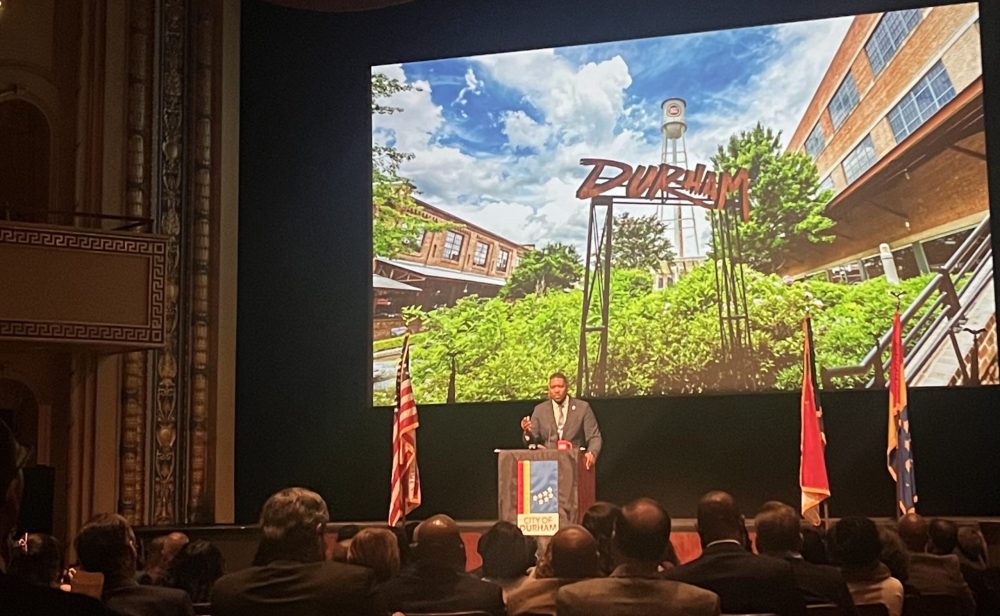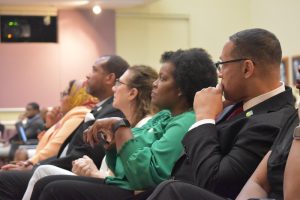North Carolina Central University’s marching band burst through the doors of the Carolina Theatre. City officials up front and citizen spectators in the back all shifted in their seats to watch, clap along, and film. The Durham Senior Divas cheerleading squad followed the band and shimmied in purple tank tops and skirts.
Minutes earlier, the crowd heard Durham’s first Poet Laureate, DJ Rogers, wearing a Black Wall Street shirt, praise Durham’s resilience. The performances turned the “State of the City” address, which usually takes place within the gray walls of City Hall, into a bustling event.
In his first “State of the City” address, Mayor Leonardo Williams tackled pressing issues such as public safety and unveiled new initiatives, but there was one thing Williams really wanted people to know: “Durham is Dope.”
“The state of the city is stronger than ever,” he said. He declared the focus of his leadership as “innovation and out-of-the-box thinking.”
Williams jumped straight into public safety, and said the top ask that emerged from a Durham resident survey was more police protection.
“It is my hope that Durham will become the most progressive city on public safety in America,” Williams said.
He recalled visiting Memphis to talk to other Black mayors about crime in Black communities. While other cities have “ideas,” Durham is building “programs” and “institutions” that others marvel at, he said.
The city’s Holistic Empathetic Assistance Response Teams (HEART), a community safety program that Durham launched as an alternative to policing, has received national attention, Williams noted.
Still, Williams, said, residents should always be able to rely on first responders. He hopes to refine their roles and direct resources towards sustainable pay and modern technology.
Young people are also key to the city’s success, Williams said.
“We have some of the best there is to offer,” Williams said as he gestured towards youth entrepreneurs, civic leaders, and advocates sitting in the audience. The city should continue to invest in this talent.
“I’m grateful for you,” he said to the young people. “I take you seriously.”
Williams then announced the launch of the Mentoring Alliance Partnership between the city’s Office on Youth and the Youth Mentoring Collaborative, a local nonprofit.
As a former teacher and school administrator, Williams often lost students to the school-to-prison pipeline — and, sometimes, to the grave. Later this year, he will launch a task force on Black men and boys that will draw upon community organizations, businesses, higher education, and the government.
An image of Williams chatting with smiley Pete Buttigieg flashed across the screen behind him. Williams shared that he had texted the United States transportation secretary the night before to thank him for the federal government’s support for the Triangle, and highlighted the millions of local and federal dollars the city invested in sidewalk repairs and transportation.
Housing, Williams said, is a human right. The city can provide housing to make living affordable while also providing open spaces and retail options. He shouted out Council member Javiera Caballero for leading a multi-institutional group to address Durham’s housing shortage.
But the city must also preserve culture in historically marginalized neighborhoods, Williams said. He commended Congresswoman Valerie Foushee for securing federal funds to revitalize the city’s South Side and help finish the construction of multifamily units at the Lofts at Southside.
Williams then highlighted the construction of multi-income units in downtown Durham and permanent units for people who are unhoused or have disabilities.
Council member Mark-Anthony Middleton helped launch a $10 million revitalization plan for neighborhoods in the Fayetteville Street Corridor, which includes the historic Hayti community, Williams said. He recounted the Durham Freeway’s destruction of Hayti, once a thriving Black business community. Soon, Williams said, the city will complete the Reimagine Durham Freeway study.
“I’m confident in our ability to remove the significant barrier to access created by 147,” Williams said.
It is no coincidence that Vice President Kamala Harris came to Durham to announce her plans to invest in Black businesses, he said.
“I want you to be open-minded as we consider ways to reconnect, rebuild, and re-establish what helped make this community known as Black Wall Street,” he said.
Williams also mentioned the newly established Durham Next nonprofit, which hopes tol help build a new Durham Convention Center in order to further increase tourism and help attract more businesses.
Williams also announced his creation of industry-specific mayoral guilds to involve citizens in addressing issues from housing to economic developments, and an early high school program for students interested in working in the healthcare sector. He pledged to improve the city’s partnerships with corporations such as Google and institutions such as Duke University.
There was a lot to celebrate, too. Williams acknowledged the school board’s perseverance amidst recent difficulties, but also said that Durham Public Schools reduced the number of failing schools from 21 to five in just a few years. The city was ranked as the 17th best place to live by Money Magazine, he added. Throughout the speech, Williams gifted officials and community members with flowers.
“We are human, too,” Williams said. He emphasized that running a city is tough work for the plethora of officials who do it. But it’s worth it to him, he said. He believes in the city.
The words “DURHAM IS DOPE” loomed overhead on a screen behind the mayor as the theater emptied out.
Above: Mayor Leonardo Williams delivers his “State of the City address. Photo by Charlotte Kramon — The 9th Street Journal




